16 Apr 2014 | Greece, News and features, Politics and Society
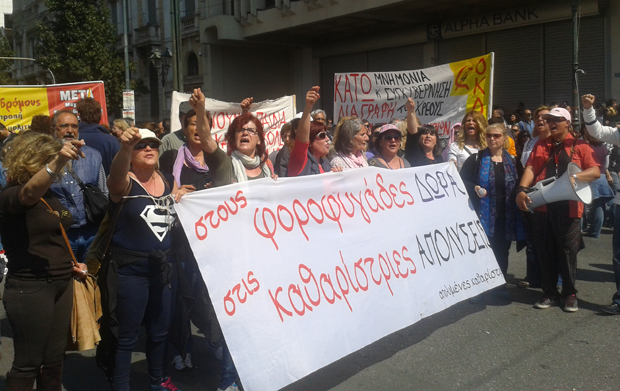
Greek protesters voiced their opposition to further austerity measures on Wednesday 9 April as Greece returned to international finance markets. (Photo: Christos Syllas for Index on Censorship)In a televised address last Thursday, Greek Prime Minister Antonis Samaras thanked the Greek people for the sacrifices they endured during the past four years as the country underwent the harshest austerity measures since emerging from World War II. While hailing the country’s return to the international finance markets after a four-year absence, the prime minister and the coalition government glossed over policies that have resulted in a negative environment for free expression — whether through protests or the press.
Along with the “world of labor” being constantly undervalued, the policies put in place are having a huge impact on the freedom of speech. In a more precise manner, the non-dominant anti-state and anti-government political discourse produced by certain political spaces such as the radical left and anarchists poses a serious threat to the government propaganda. Political dissidents are being targeted, arrested and systematically abused for protesting against the government. At the same time, press freedom is under attack when attempting to speak about the costly agreements with the troika. Also, recent struggles for education came face to face with police interference and student profiling.
The economic implications of the Greek austerity drive are falling mostly on the working class, who are losing hard won benefits without their unions taking a clear stand against the rollbacks. The government is currently legislating a new round of liberalization measures.
On 9 April, an anti-austerity strike was held in Athens with thousands of people rallying against government policies. Although the strike lacked the mass participation and intensity of past rallies, as in 2012, demonstrators managed to manifest their dissent against sweeping socio-econonic measures.
According to the latest data from the Hellenic Statistical Authority, Greece’s unemployment in January 2014 was 26.7%, up from 26.5% a year ago and down from 27.2% in December. The same figure back in January 2009 was at 8.9%. The economic downfall can be clearly seen at the unemployment rate among 15-24 years old and 25-34 years old: 56.8% and 35.5% respectively.
Workfare policies through voucher programmes, initially introduced as a government solution to unemployment, exploit the large reserve of unemployed while undermining the ability to collectively bargain working conditions and pay.
“It is a dead end. If you take a closer look today -a day of strike-, you will see that many coffee shops and sales shops are open. Austerity measures, up to now, seem to be effective in dividing working class people and overturn any social struggle. There’s still a long way to fight properly…”, a 29 year-old protester, who has been unemployed for two years, told Index on Censorship.
Human rights abuses against immigrant workers — the most undervalued part of workforce in Greece — confirm the agenda of a police state flirting with racism and xenophobia.
The dramatic escalation of refugee and migrants’ mistreatment, both by the state and the banned neo fascist party Golden Dawn is indicative. In a recent provocation some Golden Dawn followers organized an intimidating gathering outside the offices of Medecins du Monde, an NGO that provides medication and healthcare services to immigrants as well as Greeks.
However, mainstream media outlets have failed to report on the contradictions that arise from Golden Dawn’s background and relationships. Index on Censorship has thoroughly reported on the affinities of the right and the far-right political spectrum and has identified some key actors that connected ruling party New Democracy with Golden Dawn. One of them, was the former cabinet secretary Panayiotis Baltakos.
Baltakos was recently forced to resign over a leaked video, which showed him having a conversation with the spokesman of Golden Dawn Ilias Kasidiaris. In the video, Baltakos admitted that the government had to press judges to prosecute Golden Dawn’s former members of parliament.
It is worth noting that a year ago, Baltakos had allegedly said that cooperation between New Democracy and Golden Dawn in upcoming elections is “undesirable but not an unlikely possibility”.
The continuous flirting between the ruling New Deomocracy and the now-banned Golden Dawn either takes the form of a “relationship” or of a “conflict”. It is shaping the news agenda and it sets the tone ahead of the European and local elections in May.
In an e-mail interview that took place in January, Index asked Cas Mudde, assistant professor in the Department of International Relations at the University of Georgia, in whose interest is the threat of the far-right is working.
“I would expect that the far right today wins mostly from mainstream right-wing parties – in many countries they won over the left-wing voters in the late-1980s/early-1990s. At the same time, they often attract many new and former non-voters, who would probably traditionally have gone to the center-left”.
Mudde also claims, among other things, “that European politicians use the alleged threat of a far right resurgence, backed by the economic crisis thesis, to push through illiberal policies”.
In this context, on 11 April, German Chancellor Angela Merkel visited Athens. Aside from the mainstream media’s enthusiasm for the return to financial markets, few read between the lines. Merkel’s visit was a sign of support for the Greek government’s austerity measures – despite what the Greek public thinks
Experts warn that even now that “the mood has changed”, the debt crisis and the consequent austerity measures do not necessarily come to an end.
This article was published on 16 April 2014 at indexoncensorship.org
7 Apr 2014 | Europe and Central Asia, Greece, News and features
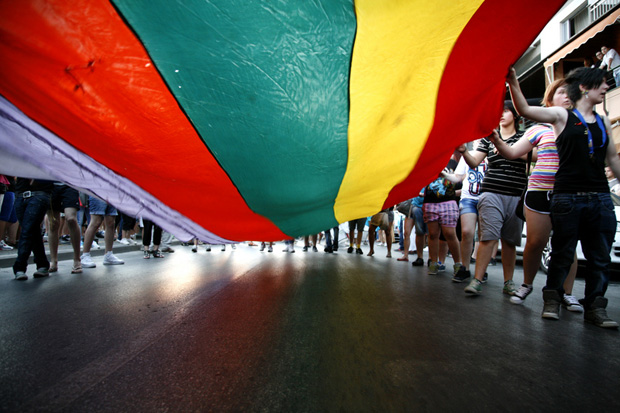
Thessaloniki Pride parade 2012 (Image: Konstantinos Tsakalidis/Demotix)
There is a “dictatorship of the gay minority” and gay people should be “treated” by members of Golden Dawn. These are only excerpts of a 15-minute homophobic rant by journalist Dimos Verikios during a recent episode of his daily show on Alpha radio station. The outburst was met with a number of complaints and social media outrage, and has been condemned by the Journalists’ Union of Athens Daily Newspapers.
Verikios was targeting gay writer Auguste Corteau, who revealed his sexuality by publicly stating that he won’t be joining new political party The River, preferring to stay loyal to his husband and his books. In response to this, the radio host among other things said: “That’s why society goes to hell. Being gay today and crying it out loud is considered a cunning behaviour and not a problem.”
Verykios’ outburst seems to be only the tip of the iceberg. Homophobic stereotypes and discrimination based on sexual orientation is widespread in Greece, both on state level and in wider society. The 2013 annual report by the European arm of the international gay right organisation ILGA, reports a wave of violence directed at the LGBTI community by extremists, ranking Greece 25th out of 49 European countries for gay rights. In 2012, European Commission against Racism and Intolerance urged Greek authorities to raise awareness “on the implementation of the principle of equal treatment regardless of racial or ethnic origin, religious or other beliefs, disability, age or sexual orientation”.
The extension of legislation (institution of civil partnership) to same sex couples has “frozen” because of continuing pressures from the Greek Orthodox Church, while at the same time the country has been found violating the European Convention of Human Rights. Index has previously reported on homophobic behaviour and attacks by Golden Dawn and its supporters. Firstly, regarding the persecution of people involved in the play “Corpus Christi” and secondly, regarding the mockery of journalist Tasos Theodoropoulos by the far-right publication called “Stohos”, and the subsequent attack on him.
Electra Leda Koutra is the president of the NGO Hellenic Action for Human Rights and lawyer for the Greek Transgender Support Association. She was harassed by policemen and illegally detained for a short while last June for trying to communicate with her transgender client. “Many cases do not reach the courts because of the ‘outing’ that the victims would have to unwillingly go through during the legal procedure,” she explains to Index, adding that many of these cases often go unresolved.
Verykios outburst was answered by a collective complaint from the LGBTQI community — nearly 20 organisations and collectivities took part — to the National Council for Radio and Television (ESR). The president of ESR, Ioannis Laskaridis, said told media that the volume of complaints filed was “unusual”.
Corteau is suing Verykios over the statements, posting on his Facebook page that: “I have decided that I have a duty to stand up for and protect the people I love and then any person that could find themselves in my position, a target of the poisonous language represented by Mr Verikios.” Corteau’s lawyer Christos Gramatidis explained the nature of the legal action to Index: “It is the first lawsuit of its kind (compensation for moral damages, eponymous opposing parties) based on the basis of attacking personality and consisting of libel and insult of gender identity. As a country we haven’t incorporated yet the European legal framework of combating intolerance”.
Gramatidis added: “There are so many people from the LGBTI community who accept bullying in schools and elsewhere in society but they do not have the ability to go into court.”
This article was published on 7 April 2014 at indexoncensorship.org
24 Feb 2014 | Europe and Central Asia, Greece, News and features
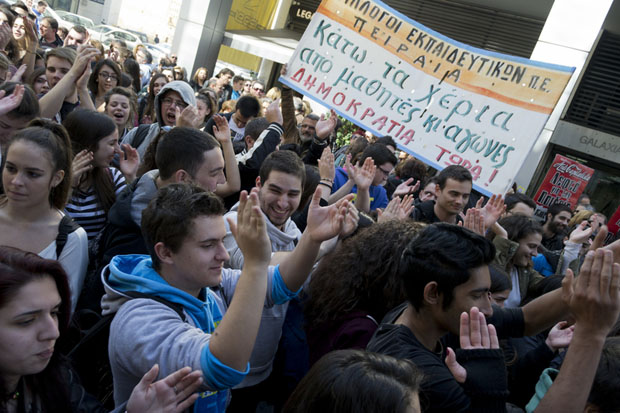
Students protesting outside the offices of Piraeus Public Prosecutor (Image: Nikolas Georgiou/Demotix)
Between 200 – 250 students last week staged a demonstration outside the offices of the Piraeus’ Public Prosecutor against police interference in school protests, following high school students being taken in for police questioning.
Joined by the Secondary Teacher Union of Piraeus and the Parent Association of Keratsini the students shouted slogans like “we won’t be terrorised” and “money for education”. The protest came after students were interrogated by police over an occupation of Keratsini’s 2nd High School in October, in protest at the murder of rapper Pavlos Fyssas by a member of the far right Golden Dawn.
Students were asked about their own and their teachers’ political preferences, especially those who had been striking against public job cuts and forced transfers. There were also media reports that students were questioned about their parents’ voting preferences. A high school student who participated in the protest said they were asked “to give as many names as possible”, adding that they were threatened with having a criminal record if they refused.
Greek police has said it was obliged to conduct an investigation into the matter. It did so on the basis of a legislative act from 2000 punishing by imprisonment attempted occupations or disruption of the “smooth functioning” of a school. The act remained inactive until 2011 when school protests against government plans on privatisation of education, prompted a Supreme Court order for investigations in schools.
Maria Delli, board member of the Parent Federation in Attica District told Index on Censorship: “It is not an unprecedented incident, we have been experiencing police interference and student profiling in recent years. The government is trying to criminalise the common struggles of students and teachers for education. Students complain about the obvious: Not having teachers, not having heating infrastructures and having to pay for their books during the economic crisis.” She added that there was no damage to the school.
Nikos Peritoyannis, president of Parent Association of Keratsini commented to Index on Censorship: “It is a positive outcome. It can be definitely seen as a result of the pressure from the protest actions undertaken by students, teachers and other social groups. However, it does not mean that similar cases will cease to exist. As the struggle against the privatization of education goes on, the government will have to intensify monitoring and suppressing policies.”
On Monday 20 February, Piraeus’ Public Prosecutor finally decided to temporarily withdraw the case as there was no criminal offence for which to prosecute the students. Apart from the incident in Keratsini, Athens’ Attica General Police Directorate (GADA) has also issued a document informing police stations to conduct meetings with school directors in order to disclose “any immediate problems schools are facing”. On 13 February, a similar document reached the director of a kindergarden in New Psychiko, Athens. There was public outcry from teachers’ associations in the media.
This article was posted on 24 February 2014 at indexoncensorship.org
3 Feb 2014 | Greece, News and features, Politics and Society
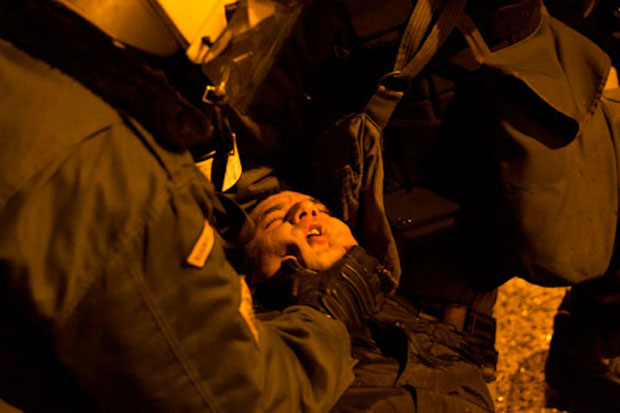
Unconscious protester dragged by police during an anti-fascist demonstration (Image: Nikolas Georgiou)
Following the reappearance of Golden Dawn’s “battalion squads” last week in Keratsini, where hip hop artist Pavlos Fyssas was murdered, antifascist rallies and demos are increasingly met with state repression and police violence.
On 25 January, a group of 80-100 neo-fascists took down a banner in Fyssas’ honour and attacked a self-managed hangout called “Resalto”. As documented on social media, the riot police merely looked on during the attack.
On Saturday 1 February, two protests, one from anti-fascists and anarchists, and one from Golden Dawn, were planned at different locations in the centre of Athens.
Anti-fascists were calling for a rally in protest at Golden Dawn’s disrespect to Pavlos Fyssas, as well as the refugee tragedy at Farmakonisi, an alleged pushback operation which had already prompted an investigation and led to condemnation from international human rights organisations.
Golden Dawn had called for its annual march at the Imia memorial. Members and supporters of the party gathered to commemorate the Imia crisis in 1996, a conflict between Greece and Turkey over two small rocky islands during which three Greek navy officers died.
Even though the police had banned all marches — though not rallies — “for reasons of public safety”, Golden Dawn defied the ban and marched through central Athens. There was no intervention from the police.
Elsewhere in the capital, at Syntagma Square, clashes broke out between protesters and the police when two men with Greek flags on their jacket were spotted and chased down. One of them managed to escape through the riot police and the other one was attacked and injured slightly. Despite anti-fascist efforts to safeguard the rally, riot police dispersed the protesters using stun grenades and tear gas. Some protesters were arrested.
Nikolas Georgiou, an independent photojournalist, witnessed an unconscious man being dragged by police.
“They had him in handcuffs and he had already passed out when they started dragging him. It was only when a colleague of mine told them that he was not breathing, that they seemed to worry,” Georgiou told Index on Censorship.
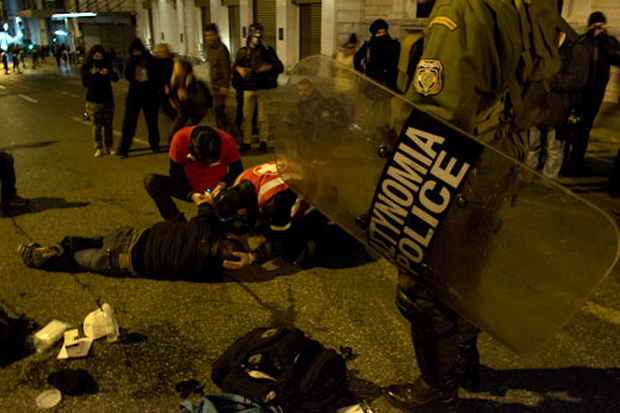
Police clashed with anti-fascist protesters in Athens. (Photo: Nikolas Georgiou)
When a member of parliament asked riot police to explain the incident, the answer given was that the protester had “slipped and he fell”.
The man, a Turkish refugee named Saltchuk Gungor, was transferred to the Georgios Genimatas Hospital under close supervision of riot police squads.
People expressing solidarity with Gungor complained about the police presence, while Syriza’s MP Afroditi Stampouli denounced the incident as “unacceptable for democracy”.
Gungor is being charged with the felony of assaulting police officers while having his face covered. He, however, denies the charges: “I didn’t do anything. I was attacked without a reason. They hit me and they dragged me down,” he stated on the website left.gr. Photos taken by witnesses show that Gungor did not have his face covered.
The clashes did not stop at Syntagma Square. Police squads chased anti-fascists at the Monastiraki subway station. They used tear gas amid commuters and chased people through the subway rails.
Golden Dawn also announced its “plan B” at Saturday’s rally — the founding of a party called “National Dawn”. If the government decides to continue the ban of Golden Dawn, the new party will serve as an alternative.
Half of Golden Dawn MP’s are being prosecuted with charges of being part of “a criminal organization”, and one third are now in jail.
This article was posted on 3 February 2014 at indexoncensorship.org





